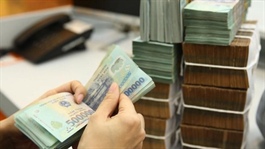Experts warn about participation of real estate companies in banks
Experts warn about participation of real estate companies in banks
Experts have raised concerns about the involvement of real estate companies in commercial banks, warning it may pose risks to the financial system and the whole economy.

According to the experts, the participation of real estate companies in banks can adversely influence these banks’ lending practices. Leaders of real estate companies, who are also ultimate owners of certain banks, can channel more loans to their real estate projects, online newspaper bnews.vn reported.
Expert Nguyen Tri Hieu said real estate companies, which serve as “backyards” of banks, often issue bonds and sell them to the banks. This is also a form of lending and is used as one of the effective financial tools to help real estate developers get bank loans, but the risk of lending has been masked.
In fact, in recent years, along with the Government’s policies to promote the country’s capital market development, the form of corporate bond issuance has been favoured by many real estate companies. However, it is noted banks and securities companies were reportedly the largest buyers of the bonds.
Recent statistics of the Saigon Securities Incorporation, showed firms issued bonds worth a total of VND722.7 trillion in 2021, an increase of 56 per cent compared to 2020. Among them, real estate firms were the largest issuers, accounting for 44 per cent of the total amount of the bonds and increasing by 66.3 per cent against the previous year.
Le Xuan Nghia, director of the Institute of Business Research and Development, also expressed concern that bank loans flowed into real estate companies, which serve as “backyards” of banks, through the corporate bond purchases. It is alarming as the loans were large.
According to Dinh Trong Thinh, senior lecturer of the Academy of Finance, cross-ownership between real estate companies and banks can cause banks to give the companies priority in getting loans in some cases. This will cause many consequences in the banks’ lending besides creating inequality among firms in access to bank loans.
Though the State Bank of Vietnam has regulations on lending limits to real estate, such as Circular 22/2019/TT-NHNN on further incentivising real estate developers to acquire major stakes in commercial banks, bankers or members of the banks’ board of directors still have many ways to help their real estate companies get bank loans, Thinh said.
According to the Institute of Southeast Asian Studies (ISEAS), while it is now harder for real estate tycoons to manipulate banks, there are still certain loopholes that they can take advantage of. Through the complex networks of subsidiaries and affiliated companies, these ultimate shareholders can channel credit to their own companies, bypassing regulations on credit and lending limits for the real estate sector. For example, they can interfere so that banks will lend to affiliates that are not directly involved in the real estate sector by building up shell companies in other industries to borrow from banks. At the end of the day, money will still be channelled to their real estate business through these shell companies.
With the rise of shadow banking, fintech apps and retail lending arms, these wealth transfers can become too complicated to trace as shell companies can borrow from different arms of a commercial bank. It is therefore extremely hard for regulators to determine how much a bank is exposed to an ultimate borrower. It is also difficult for regulators to monitor which banks are exposed to cross-holdings by real estate developers and act before a problem becomes too big to tackle. Real estate developers can continue to come up with new ways to manipulate banks, and regulators are usually a few steps behind, ISEAS said.
To avoid these risks, ISEAS suggests regulators need a better information system to trace the ultimate ownership of commercial banks and mitigate ownership concentration.
Furthermore, ISEAS said, requiring board diversity and enhancing the role of independent directors are best practices that Viet Nam can adopt. When ownership is not concentrated into a few large shareholders and independent directors can challenge shady business practices, banks will be better governed and better prepared to deal with external shocks.

























